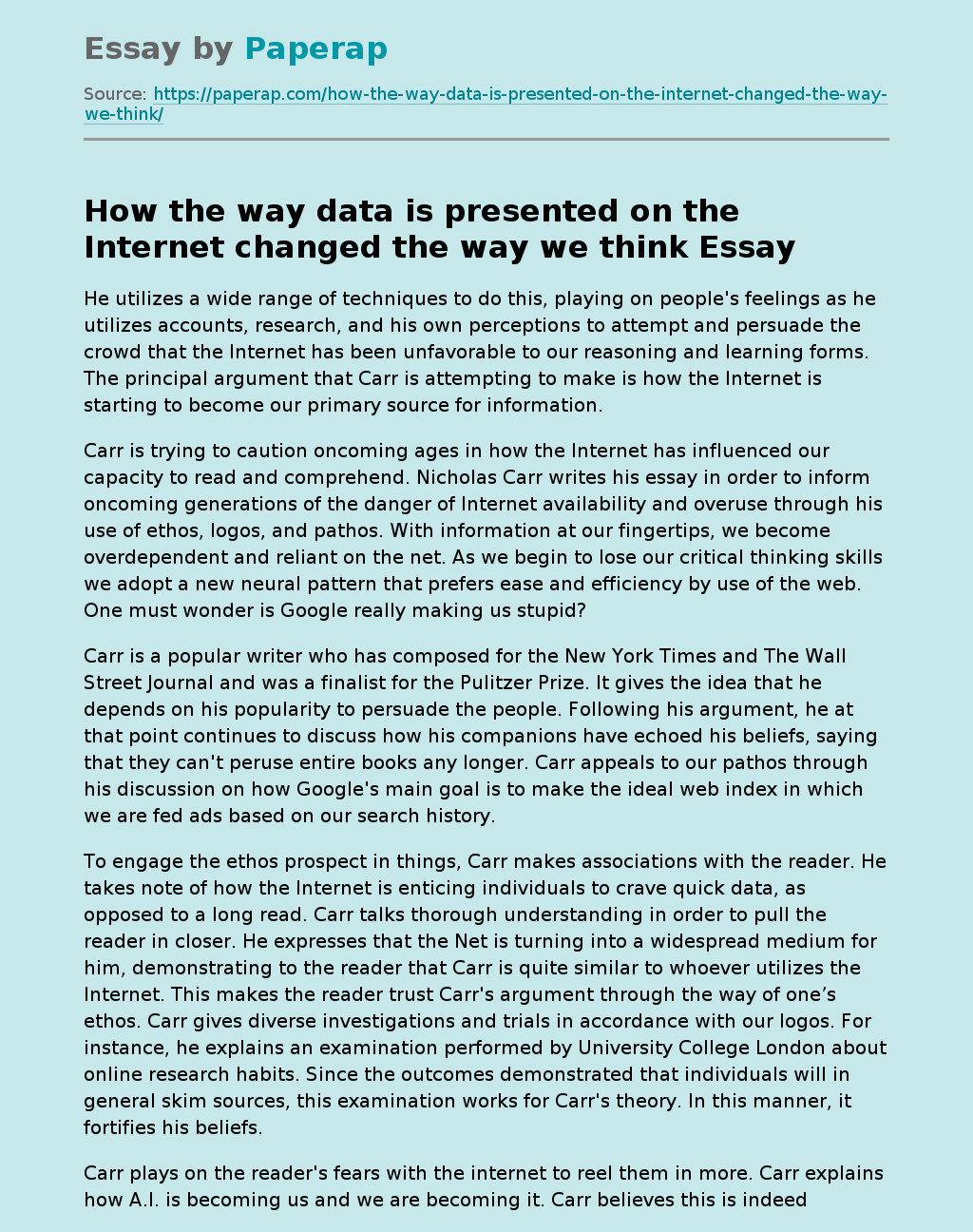How the way data is presented on the Internet changed the way we think
He utilizes a wide range of techniques to do this, playing on people’s feelings as he utilizes accounts, research, and his own perceptions to attempt and persuade the crowd that the Internet has been unfavorable to our reasoning and learning forms. The principal argument that Carr is attempting to make is how the Internet is starting to become our primary source for information.
Carr is trying to caution oncoming ages in how the Internet has influenced our capacity to read and comprehend.
Nicholas Carr writes his essay in order to inform oncoming generations of the danger of Internet availability and overuse through his use of ethos, logos, and pathos. With information at our fingertips, we become overdependent and reliant on the net. As we begin to lose our critical thinking skills we adopt a new neural pattern that prefers ease and efficiency by use of the web. One must wonder is Google really making us stupid?
Carr is a popular writer who has composed for the New York Times and The Wall Street Journal and was a finalist for the Pulitzer Prize.
It gives the idea that he depends on his popularity to persuade the people. Following his argument, he at that point continues to discuss how his companions have echoed his beliefs, saying that they can’t peruse entire books any longer. Carr appeals to our pathos through his discussion on how Google’s main goal is to make the ideal web index in which we are fed ads based on our search history.
To engage the ethos prospect in things, Carr makes associations with the reader. He takes note of how the Internet is enticing individuals to crave quick data, as opposed to a long read. Carr talks thorough understanding in order to pull the reader in closer. He expresses that the Net is turning into a widespread medium for him, demonstrating to the reader that Carr is quite similar to whoever utilizes the Internet. This makes the reader trust Carr’s argument through the way of one’s ethos. Carr gives diverse investigations and trials in accordance with our logos. For instance, he explains an examination performed by University College London about online research habits. Since the outcomes demonstrated that individuals will in general skim sources, this examination works for Carr’s theory. In this manner, it fortifies his beliefs.
Carr plays on the reader’s fears with the internet to reel them in more. Carr explains how A.I. is becoming us and we are becoming it. Carr believes this is indeed troubling. Carr depends on the utilization of ethos, pathos, and logos all through his article. His ethos is basically centered around associating with the peruser as a kindred person. His logos is mostly contained citing tests and referencing chronicled advancements. His pathos is created through fear byways of Internet abuse.
The motivation behind this article, Is Google Making Us Stupid? is to sway the audience of the web. Nicholas Carr is advising individuals on how the web might influence their cerebrums through this article. Carr closes his article with this overwhelming articulation: “…as we come to rely on computers to mediate our understanding of the world, it is our own intelligence that flattens into artificial intelligence.” Criticism of the net commonly questions whether we are becoming more superficial and scattered in our pattern of thinking.
As a writer, Carr views the net as a valuable tool but fosters a hindrance in concentration. He says ‘Once I was a scuba diver in the sea of words. Now I zip along the surface like a guy on a Jet Ski.’ It is evident that we as a people are more familiar with reading due to the web but as Carr also explains it disrupts ‘our ability to interpret text, to make the rich mental connections that form when we read deeply and without distraction, remains largely disengaged.’ It is a no-brainer that our habits are changing. The net has galvanized us and has developed into the starting point for the majority of our work. So I ask you again, Is Google really making us Stupid?
How the way data is presented on the Internet changed the way we think. (2021, Dec 03). Retrieved from https://paperap.com/how-the-way-data-is-presented-on-the-internet-changed-the-way-we-think/

